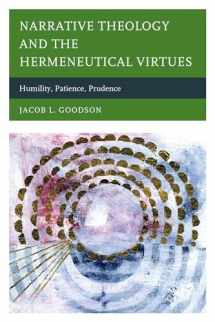
Narrative Theology and the Hermeneutical Virtues: Humility, Patience, Prudence
ISBN-13:
9780739190135
ISBN-10:
073919013X
Author:
Jacob L. Goodson
Publication date:
2015
Publisher:
Lexington Books
Format:
Hardcover
226 pages
Category:
Christian Books & Bibles
FREE US shipping
Book details
ISBN-13:
9780739190135
ISBN-10:
073919013X
Author:
Jacob L. Goodson
Publication date:
2015
Publisher:
Lexington Books
Format:
Hardcover
226 pages
Category:
Christian Books & Bibles
Summary
Narrative Theology and the Hermeneutical Virtues: Humility, Patience, Prudence (ISBN-13: 9780739190135 and ISBN-10: 073919013X), written by authors
Jacob L. Goodson, was published by Lexington Books in 2015.
With an overall rating of 4.4 stars, it's a notable title among other
Christian Books & Bibles
books. You can easily purchase or rent Narrative Theology and the Hermeneutical Virtues: Humility, Patience, Prudence (Hardcover) from BooksRun,
along with many other new and used
Christian Books & Bibles
books
and textbooks.
And, if you're looking to sell your copy, our current buyback offer is $0.3.
Description
In Narrative Theology and the Hermeneutical Virtues: Humility, Patience, Prudence, Jacob L. Goodson offers a philosophical analysis of the arguments and tendencies of Hans Frei’s and Stanley Hauerwas’ narrative theologies. Narrative theology names a way of doing theology and thinking theologically that is part of a greater movement called “the return to Scripture.” The return to Scripture movement makes a case for Scripture as the proper object of study within Christian theology, philosophy of religion, and religious ethics. While thinkers within this movement agree that Scripture is the proper object of study within philosophy and religious studies, there is major disagreement over what the word “narrative” describes in narrative theology. The Yale theologian, Hans Frei, argues that because Scripture is the proper object of study within Christian theology and the philosophy of religion, Scripture must be the exclusive object of study. To think theologically means paying as close attention as possible to the details of the biblical narratives in their “literal sense.” Different from Frei’s contentions, the Christian ethicist at Duke University, Stanley Hauerwas claims: if Scripture is the proper object of study within Christian theology, then the category of narrative teaches us that we ought to give our scholarly attention to the interpretations and performances of Scripture. Hauerwas emphasizes the continuity between the biblical narratives and the traditions of the church. This disagreement is best described as a hermeneutical one: Frei thinks that the primary place where interpretation happens is in the text; Hauerwas thinks that the primary place where interpretation occurs is in the community of interpreters. In order to move beyond the dichotomy found between Frei’s and Hauerwas’ work, but to remain within the return to Scripture movement, Goodson constructs three hermeneutical virtues: humility, patience, and prudence. These virtues help professors and scholars within Christian theology, philosophy of religion, and religious ethics maintain objectivity in their fields of study.


We would LOVE it if you could help us and other readers by reviewing the book
Book review

Congratulations! We have received your book review.
{user}
{createdAt}
by {truncated_author}


